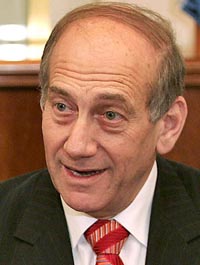Israeli PM encouraged by firm Chinese stance on Iranian nuclear issue
Israeli Prime Minister Ehud Olmert said Thursday he was surprised and encouraged by talks with Chinese leaders who told him they were strongly opposed to Iran having nuclear weapons.

Olmert met with Chinese President Hu Jintao, who hailed the trip as "a very important, facilitating role in enhancing the growth of the China-Israel relationship."
The three-day visit, which ended Thursday, marked the 15-year anniversary of the establishment of diplomatic relations between the two sides, whose ties have been strained by occasional political and trade tensions.
Olmert said that his meeting with Premier Wen Jiabao on Wednesday was "surprising and encouraging."
"On diplomatic matters, it exceeded expectations ... Their comments on political matters were definitely encouraging, including, and I say this explicitly, the Iranian issue, sharply emphasizing Chinese opposition to a militarily nuclearized Iran," Olmert told reporters during a tour of Beijing's historic Forbidden City.
Olmert told Hu at the Great Hall of the People, the seat of China's legislature, that "the bond between our two peoples is a major consideration in the strategy in the state of Israel in our international affairs."
In order to expand relations, Olmert said the two sides agreed to open a third diplomatic representation office in the southern province of Guangdong.
"China is the only other country in the world, other than the United States of America, where we have more than just an embassy and consulate because China is so important for the future relations for Israel in this part of the world," Olmert said.
One of the major issues for Olmert on his visit to China was Iran's nuclear program and sanctions imposed by the U.N. Security Council for Tehran's refusal to suspend uranium enrichment.
China, a permanent council member, has strong trade ties with Iran and has been unwilling to impose punitive measures, but it supported the U.N. resolution that ordered all countries to stop supplying Iran with materials and technology that could contribute to its nuclear and missile programs. It also froze Iranian assets from 10 key companies and 12 individuals related to those programs.
Wen reiterated Beijing's support for the sanctions, saying they "showed the international concern over the Iran nuclear issue," according to state media.
The U.N. Security Council has warned it will adopt further nonmilitary sanctions if Iran continues to refuse to suspend uranium enrichment a process that produces the material for either nuclear reactors or bombs.
Iran denies that it seeks to build atomic weapons, saying its nuclear program is limited to generating electricity, reports AP.
Israel's fears that Iran is its most serious threat have been fueled by Iranian President Mahmoud Ahmadinejad's repeated calls to wipe the Jewish state off the map.
Olmert has not ruled out a military strike against Tehran's nuclear program, but has said he hoped other ways could be found to keep Iran from becoming a nuclear power.
Subscribe to Pravda.Ru Telegram channel, Facebook, RSS!


